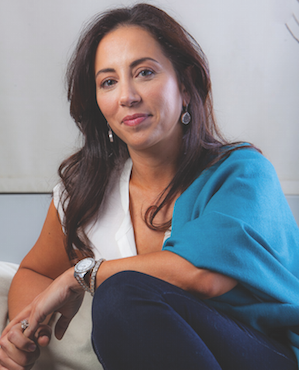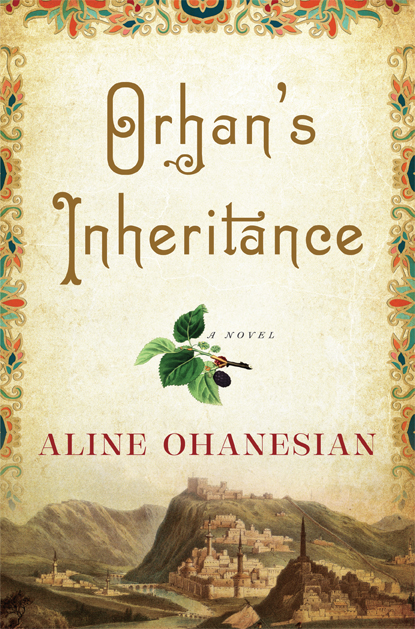 Aline Ohanesian’s great-grandmother was a survivor of the Armenian Genocide, and her history inspired Aline’s first novel, ORHAN'S INHERITANCE. It’s a tale that moves back and forth in time --- between the last years of the Ottoman Empire and the 1990s --- of passionate love, unspeakable horrors, incredible resilience and the hidden stories that can haunt a family for generations. Here, Aline recalls her mixed feelings about her family’s decidedly un-American holiday traditions, and how a gift from a polite Midwestern interloper, of all people, sparked her love of books.
Aline Ohanesian’s great-grandmother was a survivor of the Armenian Genocide, and her history inspired Aline’s first novel, ORHAN'S INHERITANCE. It’s a tale that moves back and forth in time --- between the last years of the Ottoman Empire and the 1990s --- of passionate love, unspeakable horrors, incredible resilience and the hidden stories that can haunt a family for generations. Here, Aline recalls her mixed feelings about her family’s decidedly un-American holiday traditions, and how a gift from a polite Midwestern interloper, of all people, sparked her love of books.
When you grow up among immigrants and refugees like I did, your nest is populated with furnishings so exotic and “other” that you sometimes long for what’s considered normal or humdrum. That was never truer for me than when I was a child during Christmas.
While the rest of the United States celebrated Christmas on December 25th, my Armenian family and I celebrated Sourp Dznount, or the Holy Birth, which arrived a whole two weeks later on January 6th. When I finally mustered enough courage to protest the injustice, my grandmother, the matriarch of the family, stopped rolling her grape leaves long enough to inform me that, “Armenia was the first Christian nation in the world,” and if anyone knew when Christmas was, we did.
The harsh reality of our belated Christmases didn’t hit me until I was about 10 years old. The kids in my neighborhood broke out their bikes and Barbies, and I was left out in the cold. I hadn’t learned to treasure my otherness yet. To make matters worse, my father announced that his old buddy from Lebanon would be spending Christmas with us that year, and he was bringing his new American wife. The idea of an actual American (I had met only a handful) witnessing our “weird” Christmas traditions made me anxious.
 Pat was a sweet Midwesterner who’d fallen in love with my dad’s tall, dark and almost handsome buddy, Varouj. She had straight dirty blonde hair, narrow hips and a tendency to disappear into the background, all qualities that were antithetical to the dark-haired, ball-busting women of my family. Pat carried gifts for my brother and me and sat politely smiling through conversations conducted exclusively in Armenian.
Pat was a sweet Midwesterner who’d fallen in love with my dad’s tall, dark and almost handsome buddy, Varouj. She had straight dirty blonde hair, narrow hips and a tendency to disappear into the background, all qualities that were antithetical to the dark-haired, ball-busting women of my family. Pat carried gifts for my brother and me and sat politely smiling through conversations conducted exclusively in Armenian.
At the table, the token turkey was engulfed in a sea of side dishes that read like a colorful map of the Middle East --- the tabule and kebe of Lebanon competing with the grape leaves of Greece and the cracked wheat bulgur of Armenia, each dish louder and more colorful than the next. My grandmother went out of her way for our special guests and brought out the pièce de résistance: sheep brains. My aunts ooh-ed and ah-ed. I stared at Pat, telepathically letting her know that I, at least, didn’t eat sheep brains.
After dinner, my brother and I recited the required number of Armenian poems, while Pat nodded through the whole performance. I considered belting out “Rockin’ Around the Christmas Tree” for her benefit, but I didn’t know anything but the chorus. When the time for presents finally came, we children tore through the giftwrap like ravenous dogs. I can’t remember what my brother received from Pat and Varouj, but I still own the gift they brought me that January evening: It was a boxed set of Nancy Drew hardcover books.
I had never received books as presents before, and the few I owned were flimsy paperbacks. The only books in my parents' home were my mother’s cookbooks written in various foreign tongues. Here were seven hardbound portals into the life of a feisty and inquisitive female sleuth who used her wits to solve mysteries. I glided my palm over the smooth blue and yellow covers, each one carefully illustrated with an action shot of Nancy, who, to my 10-year-old eyes, looked a lot like Pat.
I don’t know if other writers can point to the moment they fell in love with books, but I know that the boxed set Pat gave me instantly became my greatest treasure, the books’ value increasing as I read and reread them. As the years went by and I learned more about my history, I grew to appreciate my family’s attempt at keeping ancient traditions alive. Today, I let my American-born children celebrate Christmas on the 25th but insist on gathering the extended family for a feast (minus the sheep brains) on January 6th. And there are always books under the Christmas tree.


